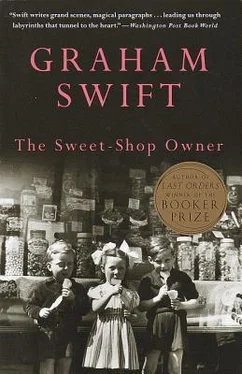Graham Swift - The Sweet-Shop Owner
Здесь есть возможность читать онлайн «Graham Swift - The Sweet-Shop Owner» весь текст электронной книги совершенно бесплатно (целиком полную версию без сокращений). В некоторых случаях можно слушать аудио, скачать через торрент в формате fb2 и присутствует краткое содержание. Год выпуска: 2012, Издательство: Vintage Books USA, Жанр: Современная проза, на английском языке. Описание произведения, (предисловие) а так же отзывы посетителей доступны на портале библиотеки ЛибКат.
- Название:The Sweet-Shop Owner
- Автор:
- Издательство:Vintage Books USA
- Жанр:
- Год:2012
- ISBN:нет данных
- Рейтинг книги:4 / 5. Голосов: 1
-
Избранное:Добавить в избранное
- Отзывы:
-
Ваша оценка:
- 80
- 1
- 2
- 3
- 4
- 5
The Sweet-Shop Owner: краткое содержание, описание и аннотация
Предлагаем к чтению аннотацию, описание, краткое содержание или предисловие (зависит от того, что написал сам автор книги «The Sweet-Shop Owner»). Если вы не нашли необходимую информацию о книге — напишите в комментариях, мы постараемся отыскать её.
The Sweet-Shop Owner — читать онлайн бесплатно полную книгу (весь текст) целиком
Ниже представлен текст книги, разбитый по страницам. Система сохранения места последней прочитанной страницы, позволяет с удобством читать онлайн бесплатно книгу «The Sweet-Shop Owner», без необходимости каждый раз заново искать на чём Вы остановились. Поставьте закладку, и сможете в любой момент перейти на страницу, на которой закончили чтение.
Интервал:
Закладка:
They shivered and their voices echoed in the bare interior. It was November, 1937. Drizzle fell in the High Street. The sea and the cliffs were gone, and he didn’t feel much at all, neither encouragement nor discouragement, standing there in that empty place — there were only some old sweet jars and a faint smell of coconut — that would be his. Brother Paul, with his long, clean fingers, took from his inside pocket a silver cigarette case, tapped a cigarette on the initialled lid, and said to Jones, ‘You understand of course it will be in my sister’s name. In the name of Mr Chapman’s wife?’
They trooped through the rain across the road to Jones’ office — it was just Jones and Partners in those days — while Jones held the umbrella so that Paul wouldn’t get wet. They mustn’t get wet, the Harrisons; they had little white laundries all over the suburbs: Jones had secured them all. A dust cart was grinding down Briar Street. In the office, sombre as an undertaker’s, with the gas fire fizzing in the corner, were Hancock, lean and suave (without his moustache then) and Joyce, chubby and pert, as though to complement him. They looked up, obliging to Paul, suspicious of him. And already, no doubt, they were spreading the word: ‘That is what’s-his-name, married to the Harrison girl — the laundry Harrisons — God knows how. House in Leigh Drive. Shop in the High Street. Sheer fluke. None of it his.’ And already he could see his legend being shaped. ‘You’ll act then for Mrs Chapman, Mr Chapman?’ said Jones drily, as if he knew a secret. ‘Of course, she will have to sign when the time comes.’ And as they departed — Paul was ahead at the door, raising his coat collar, anxious to report to brother Jack — the estate agent caught his arm and said, ‘A lovely woman, your wife.’
Jones let slip nothing. His face was full of dour discretion. But later when he told her (it was dark by then, the fire was bright and her face was mirrored in the dripping window) that it was done, and she must sign, she said promptly, turning, as if she’d only been waiting for the moment: ‘No, you must sign. The solicitors know, Jones knows. Only Paul and Jack don’t know. The shop will be yours.’ And over her lips had passed — was it? you couldn’t tell in the firelight — for the first time without its seeming like an act of charity, a smile.
‘You mean —?’
‘Yes.’
He had wanted to laugh. So she could play a trick, after all, for all that coolness. She might say next, ‘See, I was only pretending,’ and melt completely. On the table was a vase, empty of flowers, which they’d bought in Dorset. Was she laughing too, behind the shadows from the fire? Her skin was flickering. He bent forward to find out, lifting his hands. And then he’d seen, through the flames, a blankness, like the blankness in old Jones’ face: No, that doesn’t mean there is any question. He’d dropped his hands; they were still cold from walking home in the rain. It was as if he’d mistaken the reward and so appeared ungrateful. He had had to look — for it seemed he couldn’t look at her — at that reflection, thin and inaccessible, in the dark. And she’d repeated, unsmiling, as if offering a bribe: ‘The shop will be yours.’
She got up, smoothing her skirt, to make tea.
‘Don’t say you don’t want it.’
She stood looking down at him as if she’d found her balance. He must obey, perform while she watched, or she’d fall.
‘They’ll find out in time — the family I mean — but so what?’
She seemed to wobble again.
‘You’ll manage, Willy. Won’t you?’
But he had no fears for the shop. To do what was fixed for you, that was easy. The shelves were empty, the counter was laden with dust. But he would clean them, and he would buy the stock (she would give him the money) to fill them. Sweets, newspapers, cigarettes. And though he’d stood there like a dummy with Paul and old Jones, though he knew nothing of shop-keeping, he would get a shop-keeper’s coat and adopt a shop-keeper’s manner. And in time it would be wholly plausible.
‘Yes, I’ll manage.’
‘W. Chapman, Newsagent, Confectioner, Licensed to sell Tobacco.’ A sign would go up like an official stamp. He’d leave every day at six-fifteen, she’d watch him, hand at throat, from the doorway, and he’d return at seven-thirty, bearing in a briefcase the little red and black books which recorded the progress of trade and which now and then she’d open and inspect to make sure there was a healthy margin between outlay and takings. And if he should ever feel, what sham, what play-acting, she would say — how neatly she set out the table, bringing in the tea tray, the china cups, the glass sugar-bowl — Let me bear that. Let me absolve you of that. The responsibility is mine.
She put down the tea pot. She looked relieved. Perhaps they were both safe.
So nothing would happen? She poured milk, spooned sugar. That is what it meant perhaps. The shop is yours: let nothing happen. The dancing foliage of the firelight dappled her face. For one moment he wanted to sweep aside the tea cups, to catch her like some wild thing glimpsed in a forest. But her eyes sharpened, held him, as though to save him from stumbling headlong. She balanced her plate on her knee. Let nothing happen.
Though something did happen. He was fixing the name-board over the shop door; the sign-painter had finished it and he had only to fit it in its brackets. That was two weeks before he was due to open. But he wasn’t thinking of what he was doing. He was thinking of the creature disappearing into the forest. He reached out; ‘W. Chapman, Newsagent’; he toppled from the step-ladder, the name-board clutched still in his hands; broke a bone in his leg and displaced another in his back. And there he was, when the shop should have been open, lying in St Helen’s, unable to move, his leg in plaster, having tests done on his back. She came in with detective novels, grapes or bananas, first eyeing him reproachfully, as if he’d let her down perhaps, done it deliberately. Then, as she sat by the bed, her look would soften, as if in some way his accident consoled her and she meant to say: ‘See, you too are helpless. When you fall your bones break. How easily you forget how fragile you are.’
Did she foresee then, how intimately she would know that hospital?
‘Do what the doctors tell you.’ She patted his wrist. How commanding she looked, there at the bedside. And if only she would say, not that she loved him, but …
All through the visiting hours the man in the next bed, a hernia case who had no visitors, kept his eyes on her.
How auspicious. To fall and half break your back, when the shop was almost ready to open. He had to sit at home, still trussed and plastered, while she nursed and attended. She never complained. She was the soul of patience. And did her attentiveness then spring from a sense of another bargain struck? (It would be her turn, later, to be the invalid, his the nurse.) Or did it spring perhaps from her having proved her point? There was that knowing look as she helped him manoeuvre his crutches. That is what you get for adventuring, that is what you get for wanting things to happen.
So he would play his part. With a permanent limp. In six or seven years’ time people would inquire about it: Was it in the war? And he would say: What war? — I fell off a ladder.
It was summer again, summer 1938. Powell was sprinkling his watercress and lettuce. Smithy’s barber’s pole was twirling, endlessly, upwards. And the shop was open. Its coloured frontage adorned the High Street. And, sure enough, the customers came, without needing to be asked, for their cigarettes and dailies. He sold out, for the sun shone hot and bright, of lemonade and ice-cream. And not one of them doubted that he was the sweetshop owner, that he was in his rightful place behind the counter. He would play his part. What was easier? To step inside it like a bubble, to feel it buoy you up over the passing days, so that though you moved and gestured and the grime of loose change came off on your hands, you were really intact. Nothing touches you, you touch nothing.
Читать дальшеИнтервал:
Закладка:
Похожие книги на «The Sweet-Shop Owner»
Представляем Вашему вниманию похожие книги на «The Sweet-Shop Owner» списком для выбора. Мы отобрали схожую по названию и смыслу литературу в надежде предоставить читателям больше вариантов отыскать новые, интересные, ещё непрочитанные произведения.
Обсуждение, отзывы о книге «The Sweet-Shop Owner» и просто собственные мнения читателей. Оставьте ваши комментарии, напишите, что Вы думаете о произведении, его смысле или главных героях. Укажите что конкретно понравилось, а что нет, и почему Вы так считаете.












